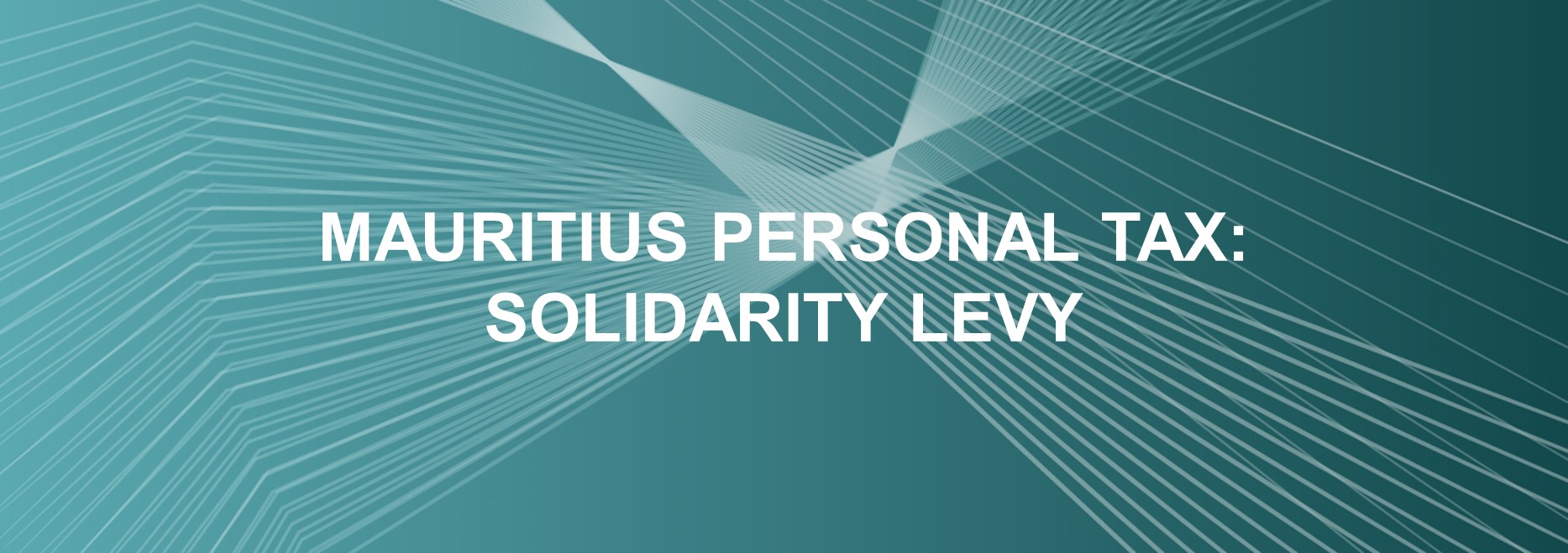- MAURITIUS PERSONAL TAX: SOLIDARITY LEVY

MAURITIUS PERSONAL TAX: SOLIDARITY LEVY
Download our At a Glance – Solidarity Levy document
There has been some major changes brought to the personal taxation in Mauritius, as announced in the 2020-2021 budget for Mauritius. Amongst others, the solidarity levy was reviewed and meant to be applicable to Mauritian residents.
Reduced threshold for the applicability of the solidarity levy
As from the income year 2020-2021, the threshold for the applicability of the solidarity levy is being lowered from MUR 3.5m to MUR 3.0m of the leviable income of Mauritius tax-resident individuals.
The leviable income of a taxpayer consists not only of the chargeable income and also includes any Mauritius sourced dividend income including the share of the dividend of an individual in a resident partnership or succession.
Increase in the standard rate of the solidarity levy
As from the income year 2020-2021, the standard rate of the solidarity levy surges fivefold from 5% to 25%. The solidarity levy payable is however restricted to a maximum of 10% of the total of net income and dividend income.
Taxpayers deriving emoluments
The solidarity levy is collected under Pay As You Earn where monthly emoluments exceed MUR 230,769 in the income year 2020-2021. For employees not submitting an Employee Declaration Form, the rate of deduction is 25% of the amount above MUR 230,769, limited to 10% of total emoluments. Their payroll system would need to be adjusted accordingly.
Tax-residence in Mauritius
The solidarity levy is only payable by tax-resident individuals who derive leviable income above the prescribed threshold. Individuals are considered tax resident in Mauritius if they meet any of the following conditions:
- They are domiciled in Mauritius, unless their permanent place of abode is outside Mauritius.
- They are present in Mauritius for a total of at least 270 days during the current tax year and the two preceding tax years.
- They are present in Mauritius for at least 183 days during the tax year.
Our comments
Many individuals who did not previously pay the solidarity levy may now fall under its scope. Those who were previously liable to pay the solidarity levy may now see an increased amount payable under the levy.
Individuals with leviable income just above the threshold of MUR 3m suffer an effective marginal tax rate of 40%. Given that the solidarity levy payable is restricted to a maximum of 10% of the total of net income and dividend income, a relief is provided to those deriving much higher leviable income.
Individuals deriving Mauritius sourced dividends may potentially be liable to a tax of 25% on the dividend received above the prescribed threshold.
Companies pay dividends out of profits which have already suffered business taxation. By contrast, expenses such as interest, rental payments, fees and emoluments lower taxable business income and therefore reduce the amount payable under business income tax. The sharp increase in the rate of the solidarity levy has accentuated the element of double taxation caused by the inclusion of dividends as part of the leviable income of individuals and subject to the levy. The double taxation of dividends reduces the attractiveness of equity capital as a method of funding businesses as compared to other funding methods.
With the differing tax rates between individuals and other entities, and the different tax effects of various business financing instruments, liability to pay the levy is not clear-cut. Taxpayers in Mauritius are advised to seek advice from their tax consultant to find out whether they are liable to pay the levy.
Businesses would need to withhold the solidarity levy under Pay As You Earn if they have employees deriving monthly emoluments exceeding MUR 230,769 in the tax year 2020-21.
DTOS provides valuable insights and value-added services to businesses and individuals with regard to their evolving present and future needs. Should you have any query in relation to the topic covered and require any assistance, please do not hesitate to contact us. We shall be pleased to assist you.
Date of Publication: 31 August 2020

